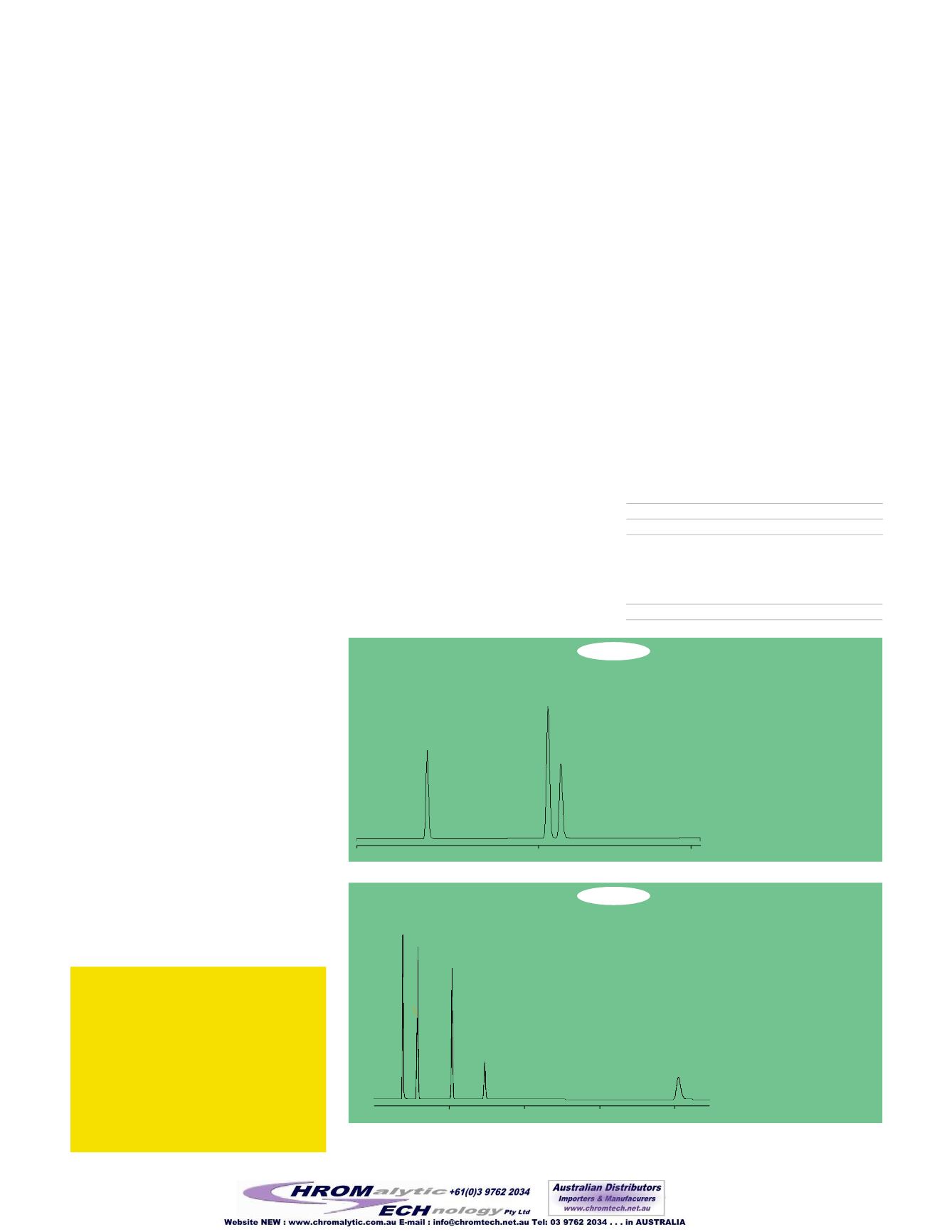

Figure 2
Permanent gases rapidly and effectively resolved from methane by an
Rt-Msieve
™
5A PLOT column.
Figure 1
Oxygen and argon resolved to baseline at above ambient temperature, using an
Rt-Msieve
™
5A PLOT column.
• 5 •
www.restekcorp.com800-356-1688
Gas-liquid chromatography (GLC), the most com-
mon mode of gas chromatography, has limited
application in analyses of gases. Subambient tem-
peratures often are required to achieve a separa-
tion, and cryogenic cooling systems are costly and
inconvenient. Gas-solid chromatography (GSC), in
which gaseous analytes are absorbed into the pack-
ing particles, rather than into a surface coating, is
far more effective for separating gases. Difficult-to-
separate small molecules, such as argon and oxy-
gen, butene isomers, and many others, can be sep-
arated by GSC at above ambient temperatures.
Just as capillary columns offer important advan-
tages over packed GLC columns, porous layer open
tubular columns—PLOT columns—offer signifi-
cant advantages over packed GSC columns. Their
open design gives PLOT columns greater perme-
ability, and their narrow diameter ensures sharper
peaks. The open construction also affords a smaller
pressure drop per unit length, so longer columns
can be used. This means much higher column effi-
ciency and, therefore, superior resolution. In brief,
PLOT columns provide faster and more sensitive
analyses than packed GSC columns.
Restek PLOT columns are especially effective for
separating mixtures of gaseous analytes. Rt-Msieve
™
5A and MXT
®
-Msieve 5A PLOT columns contain
molecular sieve 5A particles that are bonded to the
inner surface of the tubing, using a proprietary
process that prevents particle dislocation that could
damage valves and detection systems. They are
designed for fast, efficient separation of argon and
oxygen, hydrogen and helium, and other permanent
gases, including permanent gases admixed in refin-
ery or natural gas. Special coating and deactivation
procedures ensure chromatographic efficiency and
the integrity of the porous layer bonding. Finely
by Neil Mosesman, GC Columns Product Marketing Manager
Rt-Msieve
™
5A & MXT
®
-5A
PLOT Columns
Superior Analyses of Permanent Gases
✔
Fast, efficient separations at above ambient temperatures.
✔
100% bonding process eliminates the need for particle traps.
✔
Stainless steel columns for durability.
controlled pore size allows selective adsorption of
specific target compounds, ensuring difficult sepa-
rations can be made without subambient tempera-
tures. Figure 1 shows an Rt-Msieve
™
5A column can
separate oxygen from argon to baseline, at above
ambient temperature, in approximately 2 min.
Figure 2 shows the permanent gases resolved from
methane in 4 minutes.* Stainless steel MXT
®
-Msieve
5A PLOT columns offer the same powerful separat-
ing capabilities as fused silica Rt-Msieve
™
5A PLOT
columns, plus high resistance to physical damage
and ability to be coiled to diameters as small as
3.5" (<9cm), making MXT
®
columns ideal for
portable GCs, process control applications, and
other demanding situations.
In addition to Rt-Msieve
™
5A and MXT
®
-Msieve 5A
columns, we manufacture PLOT columns for a wide
range of other applications. Rt-Alumina
™
PLOT
columns (Al
2
O
3
solid phase) offer fast, reproducible
performance for determining hydrocarbon purity or
monitoring hydrocarbon streams. Porous polymer
Rt-QPLOT
™
and MXT
®
-QPLOT columns (nonpolar),
Rt-SPLOT
™
and MXT
®
-SPLOT columns (intermedi-
ate polarity), and Rt-UPLOT
™
and MXT
®
-UPLOT
columns (highly polar) are particularly useful for
situations in which water is likely to be encoun-
tered. Applications for these columns include per-
manent gases at subambient temperatures, carbon
dioxide and other inorganic gases, hydrocarbon
mixtures, and many nonpolar, intermediate polarity,
and polar solvents. For more information and
example analyses on Restek PLOT columns, refer to
our current chromatography products catalog or
our website, or request our new PLOT column flyer
(lit. cat. #59456).
If your analyses call for difficult separations of
gaseous analytes, and neither conventional packed
GC columns nor WCOT capillary columns are pro-
viding the separations you want, or your analyses
depend on costly or time-consuming conditions, a
Restek PLOT column can make your work simpler.
Restek PLOT columns are superior
for
5
reasons:
Most efficient and consistent analyses.
No need for particle traps.
Reproducible quality at affordable prices.
Most effective phase for your separation:
alumina, molecular sieve 5A, or porous
polymer.
Fused silica columns for most applications,
metal columns for exceptional durability.
Rt-Msieve
™
5A PLOT 30m, 0.53mm ID (cat. # 19723)
Sample:
0.5mL sample loop injection;
Column temp.:
27°C;
Carrier
gas:
helium;
Linear velocity:
34 cm/sec.;
Det.:
Valco HID
1. hydrogen, 29.1 ppm
2. argon, 53.4 ppm
3. oxygen, 31.3 ppm
1
2
3
Chromatogram courtesy of Larry McElmurry, Mobile Analytical Labs.
GC_PC00170
1
6
5
3
4
min. 1
2
3
4
Rt-Msieve
™
5A PLOT 15m, 0.32mm ID (cat. # 19720)
Sample conc.:
2-5 mol%;
Column temp.:
70°C;
Carrier gas:
hydrogen;
Linear velocity:
64cm/sec.;
Inj. temp.:
70°C;
Det.:
HP µTCD;
Det. temp.:
200°C ;
Sensitivity:
high
1. helium
2. argon
3. oxygen
4. nitrogen
5. methane
6. carbon monoxide
2
GC_PC00165
Ordering Information
| Rt-Msieve
™
5A
(Fused Silica PLOT)
Temp. limit to 300°C
Ordering Information
| MXT
®
-Msieve 5A
(Metal PLOT)
Temp. limit to 300°C
ID df (µm)
15-Meter
30-Meter
0.53mm 50
79721
79723
ID df (µm)
15-Meter
30-Meter
0.32mm 30
19720
19722
0.53mm 50
19721
19723
1.
2.
3.
4.
5.
1
2
3 min.
*Carbon dioxide is difficult to elute from a molecular sieve column, but is isolated easily on an Rt-QPLOT
™
porous poly-
mer column at 30°C. Request lit. cat.# 59540 for details.
For gas reference standards for
these applications, see page 10.


















